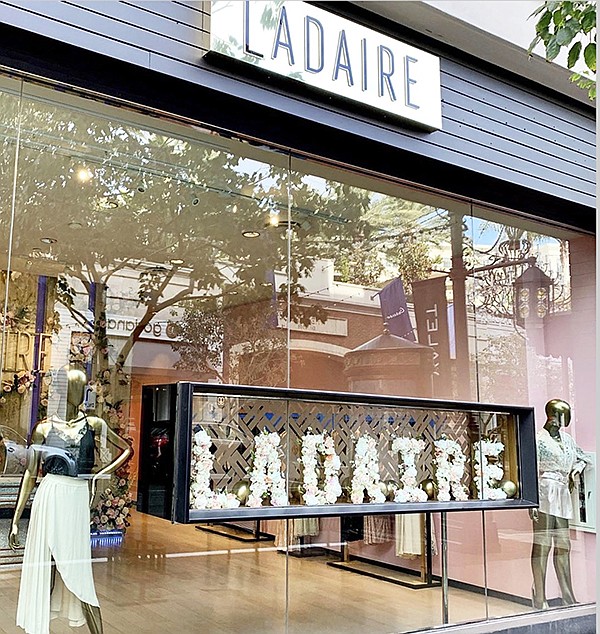RETAILERS’ ONLINE SHIFT
Retailers React to Coronavirus Epidemic by Shifting More Biz Online
Stay-at-home orders to fight COVID-19 put a sudden stop to business at the thriving Ladaire pop-up shop at the Americana at Brand retail center in Glendale, Calif., when it closed March 15. But Lili Madanyan, founder of the Ladaire contemporary women’s brand, has not stopped working.
Like hundreds of other boutique owners faced with the economy screeching to a halt, Madanyan has been improvising and developing new ways to drive sales to her company. As clients cannot visit her pop-up, she is bringing the pop-up to them.
“We’re rolling out a virtual experience for our customers,” Madanyan said. “It’s the same experience in our store, just online.”
On March 31, Madanyan started to produce virtual styling sessions and trunk shows. She is streaming them on YouTube; through her company’s Instagram profile, @ladiareofficial;and the company’s website, ladaire.com.
She and some members of her staff model Ladaire looks. Personal styling sessions for individual customers are available through Zoom and live chats online.
Various social-media influencers have volunteered to help Ladaire. These bloggers send pictures of themselves modeling Ladaire, which Madanyan has used to freshen her social-media sites.
To help drive business, Ladaire also is offering a 25 percent sale, Madanyan said.
“I don’t believe in discounting product. But it is a tough time now. So many are feeling uncertain about things. But they can feel good about this,” she said. A portion of the proceeds generated will be donated to the Glendale Fire Department and Los Angeles County healthcare providers.
Stay-at-home orders have helped certain digital retailers. The San Jose, Calif.–based e-bridal boutique Azazie said that its orders doubled because its customers can’t travel to a physical store. The e-retailer runs a try-at-home program through which samples are delivered to a residence, said Ranu Coleman, the company’s chief marketing officer. It also offers a virtual showroom where bridal parties use the Azazie application and website to view different gowns.
Immense challenges stemming from stay-at-home orders have been faced by businesses that require a customer’s personal presence, such as bespoke tailoring, said Alan Au, vice president and co-designer of the Sherman Oaks, Calif.–headquartered Jimmy Au’s for Men 5´8˝ and Under. Founded in 1961, the company carved a niche for suiting and sportswear for men of shorter stature whose sizes mainstream apparel labels don’t offer, he said.
“We’re a concierge business. We’re about service. When visitors are in town, we’ll deliver to a hotel or expedite alterations,” Au said. “We offer styling assistance to help men put looks together to make them feel confident. We do fittings at the store. It’s hard to do fittings when you can’t see someone in person. Maybe we’ll start doing fittings over Skype and FaceTime.”
About half of the company’s clients visit from outside of Southern California. Au noticed that out-of-region travel started declining in February. As companies started to close voluntarily, he and his staff were going to shift the store’s business to being appointment only.
When state and local governments issued stay-at-home orders, Au sent his staff home. But he continued to work with his store’s master tailor, who was able to operate remotely. He has been taking orders through email and over the telephone, but it’s tough to give the same service if the clients can’t visit, so the company is selling more ready-to-wear online.
“We’re selling the softest denim, sweaters, T-shirts, polos and Henleys—cozy and comfortable things to wear around the house,” Au said. “That seems to be the logical thing to do.”
When California Gov. Gavin Newsom issued a March 19 order to stay at home and shut nonessential stores, Paige Mycoskie, founder and president of the Los Angeles–headquartered Aviator Nation, panicked about paying her employees. Prior to the pandemic, Mycoskie spent 18 months opening new bricks-and-mortar stores for her label, which includes 13 shops. After Newsom announced his order to close nonessential shops, Mycoskie and her staff brainstormed and produced a March 20 flash sale to support the payroll.
Email blasts and social-media messages were sent to the brand’s customers saying that this would not be an ordinary flash sale. All sales proceeds would go to supporting staff during the shutdown. Revenue from the flash sale was $1 million, she said.
“We got messages saying that ‘I didn’t need a T-shirt, but I bought three.’ We took something awful and made something positive,” Mycoskie said. “People were glad that they could help out. We have to get creative and think outside the box and do what we can to take care of employees. People don’t have to give up.”
The increasing importance of digital commerce has become clear through this crisis. For those retailers who don’t have a strong digital platform, this is the time to build, said Syama Meagher of the Los Angeles–headquartered Scaling Retail consultancy.
“We’re counseling clients that they are not going to be able to launch e-commerce overnight. The average time to build an e-commerce store is two to three months,” Meagher said. “If you already have an e-commerce platform, this is the time to shift strategies to double down on community engagement. Make sure that you have activity on Instagram Live.”
While selling to customers is important, Meagher also mentioned the importance of relaying a sense of caring and maintaining a human touch within electronic correspondence during this sensitive time. She recommended companies include communications from CEOs as well as suggestions of things to do during the shutdown.
“Connect to consumers through newsletters and through emphatic communications,” she explained. “I’ve seen too many brands sending out emails not addressing the cultural climate. They are losing their customer base because they are not addressing it.”






















